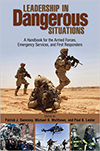Leader Vulnerability and Proactive Actions During Crisis
By Colonel (Retired) John Vermeesch, Thursday, April 02, 2020
In recent days, I've had several conversations with people about the tremendous uncertainty we all face. In some cases, these people are leaders of organizations who are struggling to make sense of what to do and how they will continue to protect and provide for the members of their teams. In these moments of volatility and complexity, leadership can be especially daunting and terribly lonely.
Leaders often struggle to know if it is okay to have moments of uncertainty and to question their own abilities to continue to lead their teams. They particularly struggle with how vulnerable they should be with their teammates, often clinging to the adage that “leaders don’t get to have bad days,” fearing that vulnerability will be perceived as weakness. I admit that is an easy path to choose, but I believe there is a difference between admitting you may not have all the answers and being weak. In fact, I believe that humility is an essential element of leadership and being aware of one’s own limitations and abilities and applying that understanding in act of leading may very well be the essence of humility. To that end, I see vulnerability as an important aspect of humility.
So, to those that have chosen to be vulnerable, I thank you. I thank you for being vulnerable, both in good times and in those that are more challenging. We often fail to recognize the inherent power of vulnerability and its unbreakable relationship with trust. You simply can't have the latter without the former, and what we all need, more now than ever, is to have leaders we can trust and to be on teams founded in trust. We also often fail to recognize that each of us must give up something in order to experience trust, and often that something is control.
Vulnerability, by definition, is the ultimate relinquishment of control. When we are vulnerable, we allow the world, or at least those whom we value the most in it, to see us for who we really are. As a former leader of large organizations in some of the most chaotic situations humanity can experience, I can say unequivocally that every leader has been where some leaders are today – questioning their very ability to lead the team and drive the proverbial bus. At some point every leader asks themselves, "who made me the driver of this bus and how did I end up here." Likewise, at some point, we each question whether we even have the skills to drive the bus. From my perspective this is natural, but in most cases, unwarranted. To those that may be asking themselves these intimidating questions right now, I offer the following: You became and are the leader for a variety of very good reasons, and in most cases, you have the steering wheel well in hand, so just keep driving! Said another way, if not you, then who? Forgive yourself for being human, we have all been there, and we all need you to keep driving!
Another closely related observation I've made in the very worst of times is that in the midst of chaos and crisis, it is a very human condition for both the leader and the team to turn entirely inward and focus on the incident, to stare at the carnage, and to cling to and comfort those closest to them. In times of crisis, comforting the team is a necessary, but insufficient, leader action. And while this observation is probably the product of my own traumatic experience as a combat leader, I sincerely believe what leaders absolutely must do in crisis, in order to truly provide both psychological and physical safety to the team, is rapidly identify a part of the team to handle the crisis and clean up the mess, and then refocus the greater part of the organization away from the incident and reestablish the perimeter and regain the initiative. Metaphorically, I believe this is true in any organization in any context. By doing so, leaders ensure the team is ready to meet the next challenge.
To that end, it’s not just okay, but expected, that every leader will have a moment of vulnerability in crisis situations. That vulnerability, as a part of the human condition, and an essential component of humility, enhances trust on the team. Having said that, leaders must also be resilient and be able to quickly transition the organization to regaining and seizing the initiative. By focusing outward and scanning the environment for opportunities to seize the initiative, they protect the team in the long run.
Colonel John Vermeesch
 ExpertiseGalvanizing teams to accomplish difficult missions, leadership and management, leadership development, coaching, character/ethical development, organizational culture, and strategic planning ExperienceJohn combines recent corporate experience with 28 years of leading Army organizations and his unique academic background to expertly craft strategic vision and translate it into operational success while adeptly developing... Read More +
ExpertiseGalvanizing teams to accomplish difficult missions, leadership and management, leadership development, coaching, character/ethical development, organizational culture, and strategic planning ExperienceJohn combines recent corporate experience with 28 years of leading Army organizations and his unique academic background to expertly craft strategic vision and translate it into operational success while adeptly developing... Read More +






